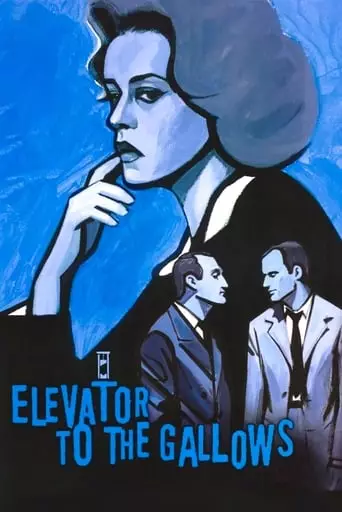A self-assured businessman murders his employer, the husband of his mistress, which unintentionally provokes an ill-fated chain of events.
Elevator to the Gallows (French: Ascenseur pour l’échafaud) is a French crime thriller directed by Louis Malle. The story follows Julien Tavernier (Maurice Ronet), a former soldier who plans to murder his boss, Simon Carala, an arms dealer, and then elope with his wife, Florence (Jeanne Moreau). Julien successfully kills Carala and stages the death as a suicide. However, in a moment of carelessness, he accidentally leaves behind a vital piece of evidence, a grappling hook, and when he returns to retrieve it, the building’s power is shut off, trapping him in an elevator.
Meanwhile, a young couple, Louis and Véronique, steal Julien’s car and end up committing a murder themselves. Florence, who has been waiting for Julien, becomes anxious when she spots his car passing with another woman, triggering a series of events that spiral out of control. The film unfolds with a mix of suspense and existential dread, focusing more on character mood and atmosphere than on tightly plotted action.
Analysis of the Film
Elevator to the Gallows is often considered a precursor to the French New Wave due to its stylistic innovation and narrative experimentation. Malle’s direction employs a minimalist approach, focusing on mood, character, and atmosphere, with the plot unfolding in a series of chance encounters and accidental crimes. Instead of relying on traditional narrative structure, Malle weaves a tale of unconnected incidents that create tension through emotional dislocation rather than logic.
The film’s most notable aspect is its cinematography, which captures the grim and smoky Parisian streets. The city itself becomes a character, a dark and imposing backdrop to the unfolding tragedy. Additionally, Malle’s use of sound, particularly the haunting and jazzy score by Miles Davis, adds layers of emotional depth to the narrative. The improvisational nature of Davis’ music complements the spontaneity of the characters’ decisions, creating an eerie contrast to the noir elements of the plot
Themes of the Film
- Fate and Coincidence: The film explores the randomness of life and the way a single mistake or coincidence can lead to catastrophic outcomes. Julien’s oversight in forgetting the grappling hook triggers a chain of events that impacts everyone involved, showing how fate is often shaped by human error.
- Moral Ambiguity: Throughout the film, characters are caught in situations where the lines between right and wrong blur. Julien, initially presented as a sympathetic figure, becomes morally compromised, while other characters, such as Louis and Véronique, are also shown making choices that lead to irreversible consequences.
- Loneliness and Desperation: Florence’s wandering through Paris, unsure of her lover’s fate, reflects the existential loneliness and despair that permeates the film. The city, with its deserted streets and flickering lights, mirrors the emotional void the characters face, particularly Florence’s uncertainty.
- War and Its Effects: The film subtly explores the impact of war on its characters, particularly Julien, a war hero-turned-criminal. The undercurrents of violence and trauma from the war are evident in his actions, which echo the disillusionment of the post-war generation
10 Reasons to Watch Elevator to the Gallows
- Innovative Cinematic Techniques: Louis Malle’s use of unconventional storytelling and atmospheric direction makes this film a unique viewing experience. The movie was ahead of its time, laying the groundwork for many later French New Wave films.
- Miles Davis’ Iconic Score: Davis’ jazz score is legendary for its improvisational style, perfectly complementing the film’s mood and heightening its tension. The score is as much a character in the film as the actors themselves.
- Gripping Noir Elements: For fans of film noir, Elevator to the Gallows provides a quintessential noir experience, featuring betrayal, crime, and moral ambiguity, all set against the backdrop of a shadowy, post-war Paris.
- Masterful Cinematography: Henri Decaë’s black-and-white cinematography captures the grit of Paris’ streets and the psychological tension of the story. The visual style is both haunting and beautiful.
- Strong Performances: Jeanne Moreau and Maurice Ronet deliver compelling performances that add emotional weight to the story. Moreau’s portrayal of Florence, in particular, showcases her ability to convey vulnerability and yearning.
- Existential Themes: The film delves deep into existential themes of fate, coincidence, and the impact of one’s choices, making it a thought-provoking experience for viewers who enjoy films that ask big questions about life.
- A Dark, Atmospheric Paris: The Paris of Elevator to the Gallows is a far cry from the typical glamorous portrayal of the city. Instead, Malle captures a shadowy, lonely Paris that feels inextricably linked to the characters’ inner turmoil.
- Precursor to the French New Wave: Watching this film allows viewers to witness the early works that influenced the French New Wave, a movement that revolutionized cinema and inspired filmmakers worldwide.
- Suspenseful and Tense: While it may not have the typical plot twists of a modern thriller, the film’s slow-burn suspense builds through atmosphere and mood, keeping viewers engaged as they wonder what will happen next.
- A Timeless Classic: Though released in 1958, the film’s themes of crime, love, and chance are timeless, making it a classic that holds relevance and emotional resonance even today.
How Will You Feel After Watching Elevator to the Gallows?
After watching Elevator to the Gallows, you might feel a mixture of unease, melancholy, and introspection. The film’s haunting jazz score, combined with its dark, atmospheric depiction of Paris, leaves a lasting impression. You may find yourself reflecting on the randomness of life and the choices that shape our fates. The film’s open-ended narrative and lack of a neatly tied-up conclusion might leave you with lingering questions, but also a sense of admiration for its artistry. Overall, it is a film that immerses you into its world, forcing you to think deeply about the human condition and the role of fate in shaping lives.

